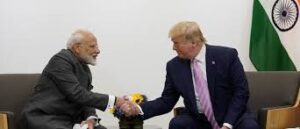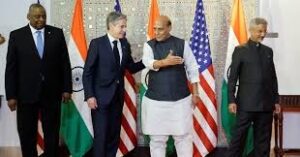Thursday, October 16, 2025
A whirlwind 24 hours in the geopolitical arena has placed India squarely at the centre of major international developments, spanning energy diplomacy, indigenous defense exports, and a startling espionage controversy in Washington D.C. From a claimed shift in Russian oil purchases to an aggressive missile sales pitch in South America, and a domestic government scrambling to counter viral fake news, this week’s headlines signal India’s increasingly complex role on the global stage.

The Oil Diplomacy Tussle: Did India Just Cede to US Pressure?
The most immediate and high-stakes news came from the Oval Office, where U.S. President Donald Trump announced on Wednesday that Indian Prime Minister Narendra Modi had agreed to halt the country’s controversial purchases of discounted Russian crude oil.
Speaking to reporters, President Trump stated that Modi had given an assurance that the cessation of these purchases would occur “within a short period of time,” though he conceded that the transition would be “a little bit of a process.”
“So I was not happy that India was buying oil, and he assured me today that they will not be buying oil from Russia. That’s a big stop,” Trump commented, linking the purchases to Moscow’s ability to fund the ongoing conflict in Ukraine.
The Context of Conflict and Tariffs
This announcement follows months of escalating diplomatic pressure from Washington. In August, the Trump administration took the dramatic step of imposing heavy 50% tariffs on a range of Indian goods—among the highest applied globally—explicitly targeting New Delhi’s continued procurement of Russian oil and defence equipment. This economic penalty marked a significant deterioration in the strategic partnership.
India, the world’s fourth-largest economy, had become one of Russia’s most vital oil customers following Western sanctions, securing crude at competitive prices to stabilise its domestic energy market. Indian officials had consistently pushed back against U.S. demands, asserting India’s right to make sovereign decisions about its energy security and pointing to the perceived hypocrisy of European and U.S. allies who continue to trade with Russia in other sectors.
India’s Ambiguous Response
Crucially, the Indian Ministry of External Affairs (MEA) has offered a carefully worded and non-committal response to Trump’s public claim. MEA officials did not confirm any recent phone conversation between the two leaders on Wednesday, stating that New Delhi’s oil procurement decisions are driven solely by the need to protect Indian consumers and maintain stable energy supplies.
While official refiners have not received a formal directive to halt Russian imports, reports suggest that Indian refiners are looking to gradually reduce their Russian dependence and are exploring enhanced energy cooperation with the United States. Trade Secretary Rajesh Agarwal indicated that India has “headroom” to potentially double its annual imports of American oil and natural gas if prices are competitive, signalling a willingness to address Washington’s concerns as part of broader trade deal negotiations.
The larger geopolitical strategy for the Trump administration is to leverage India’s potential shift to pressure other major buyers, with President Trump explicitly mentioning the need to “get China to do the same thing.” A concrete move by India would significantly impact Russia’s war funding and potentially restructure global energy supply chains.
Selling, Not Buying: India’s Defense Export Pitch to Brazil
Shifting from import disputes to export ambition, India made a major pitch to bolster its role as a global defense supplier. On Wednesday, Defence Minister Rajnath Singh met with Brazilian Vice President Geraldo Alckmin and Defence Minister José Múcio Monteiro Filho in New Delhi.
During the wide-ranging defense talks, the Indian side formally proposed supplying its indigenously developed Akash missile systems to Brazil.
The Akash System and Defense Ambition
The Akash is a medium-range surface-to-air missile (SAM) system, a product of the Defence Research and Development Organisation (DRDO). It is designed to intercept hostile aircraft, helicopters, drones, and cruise missiles with a range of up to 30 km and an altitude ceiling of 18 km. It operates on a sophisticated command guidance system and is already a crucial component of India’s own air defense network.
The discussions were framed within a commitment to advance defense cooperation, with both countries identifying priority areas for co-development and co-production of equipment. This cooperation extends to military-to-military exchanges, joint exercises, and training visits.
This proposal is a powerful demonstration of India’s growing confidence in its homegrown defense technology. By offering the Akash system, India is actively repositioning itself from being one of the world’s largest defense importers to a formidable global exporter. The move into the Latin American market, following prior deals for systems like the BrahMos and Pinaka, reinforces New Delhi’s strategy of building strategic partnerships through defense diplomacy across the Global South.

Washington Espionage Shocker: A Top India Expert Arrested
In a stunning revelation that sent shockwaves through Washington’s foreign policy establishment, Ashley Tellis—a highly respected Indian-American scholar and former U.S. government advisor—was arrested this week on charges related to national security.
Tellis, a senior fellow at the Carnegie Endowment for International Peace and a key architect of the U.S.-India civil nuclear deal, was charged with unlawfully retaining classified information and allegedly meeting with Chinese officials.
According to court documents, FBI agents discovered thousands of pages of documents marked ‘Top Secret’ and ‘Secret’ at his Virginia home. Tellis, who held a top-secret security clearance through his work as an unpaid advisor at the State Department and as a contractor for the Pentagon’s Office of Net Assessment (ONA), is accused of printing classified material regarding U.S. military aircraft and other sensitive topics. Federal prosecutors also allege he met multiple times with Chinese government officials, with one instance in which he arrived carrying a manila envelope that he did not take back.
The arrest of a figure credited with shaping modern U.S.-India strategic relations has sparked political commentary both in the U.S. and India, underscoring the delicate security environment surrounding high-level strategic policy experts. Tellis and his legal team have publicly denied the charges and vowed to “vigorously contest” any insinuation of operating on behalf of a foreign adversary.
Domestic Focus: Battling Fake News and Green Diwali
Domestically, the government of Tamil Nadu was forced to issue repeated, forceful denials to combat a wave of viral misinformation. Rumors had spread rapidly across social media platforms claiming that the state’s ruling DMK party was preparing to introduce a bill to ban the use of the Hindi language in all forms, including films, songs, and hoardings, in the state legislature.
The state government’s fact-check unit categorically labeled the claim as “completely false,” confirming that no such bill was proposed or discussed. This incident highlights the volatile nature of India’s linguistic politics, where anti-Hindi imposition sentiments in the South are easily exploited to fuel political polarization.
Finally, in Delhi, authorities have approved a cautious approach to the upcoming Diwali festival celebrations. To manage pollution levels, the government has given a green light exclusively to the use of “green crackers,” with severely limited hours for bursting them, alongside extensive monitoring. This decision seeks a balance between respecting cultural tradition and addressing the capital’s perennial air quality crisis, ensuring a safe yet celebrated festival season.





